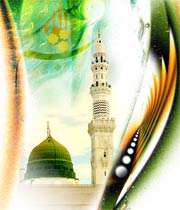
Arabia is a land of unparalleled charm and beauty, with its trackless deserts of sand dunes and mirages in the dazzling rays of a tropical sun. Its starry sky has excited the imagination of poets, travelers and mystics. It was in this land, that the Holy Prophet Muhammad, on whom be peace, was born in the city of Mecca, which is about fifty miles from the Red Sea. (Culled from Life of Muhammad by Sufi Mutiur Rahman Bengalee M.A. p.70)
It was in the latter half of the sixth century, when the world was plunged in utter darkness that the Holy ProphetMuhammad was born. The then known world stood on the verge of destruction, with chaos as the order of the day and pre-Islamic Arabia was no exception to this, rather it was in the lowest depths of abysmal darkness; infanticide was rampant, debauchery was looked upon as chivalrous, drunkenness was a common sight and all forms of evil was glorified.
1.2 J.H. Denison in his Emotions as the basis of Civilization wrote:
In the fifth and sixth centuries, the civilized world stood on the verge of chaos…. it seemed that the great civilization which had taken four thousand years to construct was on the verge of disintegration … Civilization like a gigantic tree whose foliage had over-reached the world … stood tottering … rotted to the core ….. It was among the Arabs that the man was born who was to unite the whole known world of the East and the South. (pp. 265-269)
The religious attachment of 6th century Arabia was idolatry, though there were a sprinkling of Atheists and worshippers of heavenly planets, who offered sacrifices to the sun, moon and other heavenly bodies. Christians and Jews were also to be found. The center of Christian activity was al-Najran, while the Jews were concentrated in Khaibar and Medina. In spite of these varied religious concepts, there was also a group who sought to follow the religion of their forefather Abraham. The administration of their affairs, like their religious beliefs was also in a state of disarray.
1.3 Sir William Muir had this to say:
The prospects of Arabia before the rise of Mohamet was as unfavorable to religious reform as they were to political union or national regeneration. (Life of Mohamet Intro. ch.2)
In spite of their religious and administrative divisions, the Arabs possessed a remarkable memory and were an eloquent people. Their eloquence and memory found expression in their poetry. Every year a fair was held for poetical competitions at Ukaz.
In his book The Literary History of the Arabs, R.A.Nicholson writing about the poetical ability of the Arabs, states: It is related that Hammad said to Caliph Walid bin Yazid: “I can recite to you, for each letter of the alphabet, one hundred long poems, without taking into account short pieces, and all of that composed exclusively by poets before the promulgation of Islam. (p. 1 32)
It is no small wonder, therefore, that Allah chose an Arab and the Arabic language for His final dispensation and the preservation of His Word.
The condition of the world in general and Arabia in particular is graphically put in the Holy Qur”an, when Allah says:
This is the condition which is painted by all the historians, in so many words, about the sixth century.
2. Birth of the Great leader Prophet Mohammad(P.B.U.H)
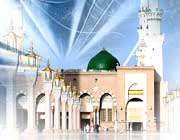
Before the birth of the Holy Prophet Muhammad, an Abyssinian army was on the verge of conquering Mecca, but were totally annihilated by small-pox, reference of which is in the Holy Qur”an chapter 105. This occurred fifty three days before the birth of our Holy Prophet, on whom be peace.
His father”s name was Abdullah who died before his birth. His mother”s name was Amina. A few days after his birth, as was the custom among the nobility of the Arabs, he was given to the care of a Bedouin wet nurse, whose name was Halima. For two years, he grew up under her care, after which , she took him back to his mother, but due to an epidemic in Mecca, he went back with Halima for another three years.
When he returned to his mother, she took him for a visit to Medina, but on the return journey, she died. At the age of six, he was entrusted to the care of his grandfather Abdul Muttalib who expired two years later. At this stage he was placed under the care of his uncle Abu Talib. In his early youth, he used to tend his uncle”s flocks.
During his youth, he joined a society whose aims were, to help the poor and the needy, safeguard the rights of the oppressed and support and uphold the cause of justice. He was also launched into commercial enterprises and undertook journeys with caravans to Yemen and Syria. His honesty and integrity earned him the title of Al-Amin – The Trustworthy. At the age of twenty-five, he was married to Khadija – a wealthy widow, whose caravans he commanded.She offered her hand to him in marriage, after she received very good reports about his conduct and honesty in the discharge of his duties as the leader of her caravans.
3. Divine Call: The Revelation
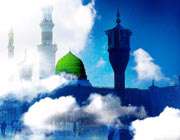
The Divine Call came to him in his fortieth year and depicting the state of mind of the Holy Prophet, on whom be peace, Thomas Carlyle in his book Heroes and Hero worship writes:
The great mystery of existence… glared in upon him, with its terrors, with its splendors; no hear say could hide that unspeakable fact `Here am I”. Such sincerity, as we named it has in very truth something divine. The word of such a man is a voice from nature”s own heart. Men do and must listen to that and to nothing else – All else is wind in comparison. From of old a thousand thoughts, in his pilgrimings and wanderings, had been in this man: What am l? What is this unfathomable thing I live in, which men call Universe? The grim rocks of Mount Hira, of Mount Sinai, the stern solitudes answered not. The great heavens rolling silently overhead, with its blue glaring stars, answered not. There was no answer. The man”s soul and what of God”s inspiration dwelled there had to answer. (pp. 63-64)
The first persons to have accepted his call , were his wife Khadija, his cousin Ali, a freed slave Zaid and his friend Abu Bakr. For three years after receiving the Divine Call, the preaching was conducted rather quietly with the number of his followers increasing rapidly. After this rather quiet start, the Holy Prophet, on whom be peace, was commanded to proclaim his message which he received from Allah, publicly. Accordingly, he addressed his message about the Unity of God and of his being the Messenger of God from every available quarter.
Since this belief was threatening their very existence, the pagan Arabs started to mount pressure on the HolyProphet, and his followers to renounce their cause and take to idol-worshipping. On one occasion, they sent a delegation to the Holy Prophet”s uncle that he should restrain the Holy Prophet, from preaching his message. They threatened Abu Talib with their combined opposition. Finding himself in this state, he sent for the HolyProphet, and explained to him the situation. The Holy Prophet, answered with these memorable words:
My dear uncle, if they should put the sun in my right hand and the moon in my left, even then I shall not abandon the proclamation of the Unity of God. I shall set up the true faith upon the earth or perish in the attempt.
Impressed with his nephew”s firm determination and high resolve, Abu Talib replied:
Son of my brother, go thy way, none dare touch thee. I shall never forsake thee.
Not being satisfied, they sent one of their chiefs to entice the Holy Prophet, and in the following words addressed the Holy Prophet:
O Muhammad, if you want to sit on the throne of Arabia we shall elect you our monarch; if you want money we shall give you no end to it and if you desire the hand of a beautiful woman, we are ready to present you the most beautiful lady in the land.
The Holy Prophet was far above any worldly temptations and in reply he recited some verses of the Holy Quran proclaiming the Unity of Allah and his claim of being a true Messenger of Allah.
The Meccans were alarmed at the prospects of trying to halt the progress of Islam, so they went to physical torment and boycott. Many influential personalities were being converted and a great mass of following were joining the religion of Islam. This in itself was a mortal threat to the existence of the Meccan chiefs, since their source of livelihood depended from the trade which came from the traffic of idol-worshippers.
Seeing that these could not be of any help, they decided to exert more pressure to the degree that when the sufferings of the Muslims became unbearable, the Holy Prophet decided to send some of his followers to Abyssinia to take refuge. The Meccans in their quest to put an end to the new religion sent a deputation to the king, seeking the return of the refugees. The king summoned the refugees and questioned them about their beliefs. Being satisfied, that they were no threat to the state, he refused to hand them over and was convinced that the revelations of the Holy Prophet and that of Jesus sprang from the same fountain.
The failure of the Abyssinian delegation, humiliated the Meccans. They pledged to completely boycott the family who defended the Holy Prophet, on whom be peace. Every kind of relationship was cut off; even food and water were denied them. The family who defended the Holy Prophet, on whom be peace, were in a desperate situation and they along with the Holy Prophet, on whom be peace, and his followers had to take refuge in the Vale of Abu Talib from where they could not escape for fear of their lives. They suffered starvation, personal indignities and humiliation of every kind. This siege continued for three years; in the meantime, the Declaration of Boycott which was hung on the walls of the Ka`ba had been destroyed and the hearts of some of the enemies were appeased. These new-found friends were bold enough to rescue the innocent sufferers from their plight.
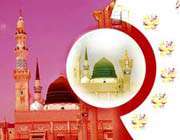
With the boycott ended, the Holy Prophet, on whom be peace, and a companion went to Taif to invite the people there to Islam, but he faced the same fate of rejection. The chiefs of Taif sent some youths after them.
They were stoned mercilessly, to the point of fainting and the body of the Holy Prophet, on whom be peace, was cut and he was bleeding profusely. The Holy Prophet, on whom be peace, and his companion Zaid, took shelter in a garden belonging to two Meccans, who, after seeing their plight, sent some grapes with a slave who was an inhabitant of Nineveh. The message of Islam was conveyed to the slave who readily accepted it.
3.1 Sir William Muir remarked on this journey to Taif:
There is something lofty and heroic on this journey of Mohamet to Taif; a solitary man, despised and rejected by his own people, going boldly forth in the name of God, and summoning an idolatrous city to repent and support his mission. It sheds a strong light on the intensity of his belief in the divine origin of his calling. (Life of Mohamet p.109)
4. Migration to Medina leading to success
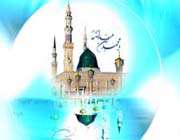
Returning to Mecca, the Holy Prophet, on whom be peace, and his followers, faced mounting persecution, the intensity of which exceeded the limits bearable by any human. At this juncture, having had assurance from some of the chiefs and people of Medina, of his and his followers” safety, he immigrated to that city with his followers. The importance of this memorable event of migration marks the reckoning of the Islamic calendar.
The Meccans did not leave the Holy Prophet, on whom be peace, and his followers to live peacefully in Medina. They sent numerous expeditions against them and waged wars against the Muslims. Every advance of the Meccans against the Muslims was crushed and they suffered humiliating defeats in their wars with the Muslims. Having been totally humiliated in their desire to crush Islam, they fell before the banner of Islam and Mecca was conquered peacefully when the Holy Prophet, on whom be peace, at the head of ten thousand of his followers entered the gates of Mecca and demolished the idols which infested the Holy Ka`ba, thus fulfilling a prophecy mentioned in the Bible as follows:
He shined forth from Mount Paran, and he came with ten thousand saints; from his right hand went a fiery law for them. (Deut. 33:2)
The Holy Prophet, on whom be peace, did not let the achievement of victory un-nerve his equilibrium in acting in a manner which would have justifiably been done in these so-called modern and advanced times. Today, many a nation and party which when placed under the said circumstances as was the Holy Prophet, on whom be peace, and his followers, would unleash a calculated and total annihilation of its enemies when it gains power and victory. Unlike these modern barbaric tendencies, when victory was the Holy Prophet”s, he never sought to seek out all those who had committed the most heinous of crimes against him and his followers. With one stroke, he forgave them all, except those few who had committed the most barbaric and unspeakable crimes against humanity.
History bears testimony to the fact, that at every step, the Holy Prophet, on whom be peace, sought to achieve peace. He even accepted a treaty which appeared to be at a disadvantage to him and his followers, simply with the intention that peace may prevail and that all forms of strife may be eliminated.
His memorable words at the Fall of Mecca are worth to be inscribed in letters of gold, studded with the most precious of gems. He said:
By God, you will have no punishment today and no reproof. (Hisham)
The teachings which were vouchsafed to him, in the form of the Holy Qur”an, lay down the principles and mechanics for the attainment of peace and the elimination of war. It says that if two parties are fighting, then peace should be made between them and the dispute settled amicably. If one or both of the parties, fail to yield to the award and all efforts of persuasion have failed, then force should be administered as a last resort, to bring the recalcitrant party or parties to submit to a peaceful settlement.
This system has laid the foundation of a powerful League of Nations, unlike the present U.N.O. whose resolutions are looked upon scornfully by defaulting nations. The U.N.O. is so structured and composed, that it is quite impotent to bring peace to the world. The two superpowers, for obvious reasons, side with one or the other of the disputing parties. If they can achieve their goal of pedaling their influence, then without any justification, they would side with any of the parties, world opinion means nothing in the present context, only might is right. The teachings of the Holy Prophet, on whom be peace, are, therefore, the only solution for the attainment of world peace and no Muslim or Muslim state which does not strive for the achievement of peace can rightfully claim a place in the body-politic of the Islamic nation and therefore cannot with any justification be among his true followers.
In the year 632 A.D. after fulfilling his mission which was entrusted to him by Allah, the Holy Prophet, on whom be peace, passed away.
 Majlis e Ulama e Shia Europe An Organisation of Shia Scholars And Communities
Majlis e Ulama e Shia Europe An Organisation of Shia Scholars And Communities